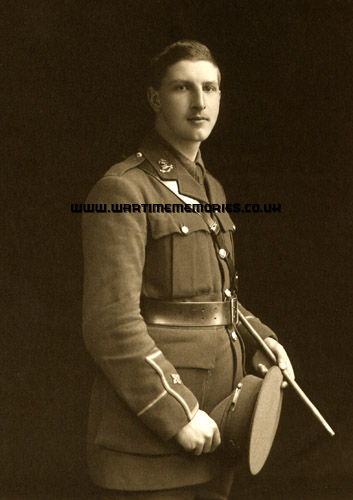Additions will be checked before being published on the website and where possible will be forwarded to the person who submitted the original entries. Your contact details will not be forwarded, but they can send a reply via this messaging system.
please scroll down to send a message
Lt John Richard "Jack" Blabey
British Army 17th Btn King's Liverpool Regiment
from:The Priory, Watergate Lane, Woolton, Liverpool
Jack Blabey was my maternal grandfather. In 1914, he was an upper sixth former at Liverpool College, where he had served in the Officers' Training Corps from 1911, reaching the rank of Corporal OTC. Along with OTC colleagues, Jack volunteered on 1914-08-28, at Lord Derby's invitation to form a 'Battalion of Pals'. Such was the uptake that three Battalions of Liverpool Pals (the first of the Pals Battalions) were provided for on that day.
Jack, however, was under-age, as the Attestation age for active service was 18 years and 6 months. However, Jack's name was taken and, in October, Jack received his papers to attend for duty.
By then, the first three Battalions were provided for, so he enlisted into the 20th Battalion - the '4th City Pals'.
The Pals Battalions spent months acquiring soldierly skills, and were short of officers. As OTC members, Jack and his colleagues knew much and were deemed to have officer-lie qualities. He was trained and commissioned into the 17th Battalion (1st City Pals) as a Second Lieutenant, KLR in February 1915.
Training of the Liverpool Pals Brigade was completed at Knowsley, Belton Park and Larkhill, before the Brigade was deployed to France, in the Somme sector, in November 1915.
The Liverpool Pals served with distinction in the Battle of the Somme, achieving their objectives on the first day, seizing the village of Montauban, with the 17th, 19th and 20th Battalions suffering relatively few casualties.
The 18th Btn suffered heavy casualties and required refitting before further service. Later in the battle, the Liverpool Pals were back in action, in an attempt to move forwards and take the village of Gillemonte, attacking over open ground and with German machine gunners firing from an enfilade on the left. As the attack progressed on 30th July, Jack suffered a serious head wound, when a German machine gunner sighted his platoon moving. Fortunately, he had his helmet pushed back as he scanned the horizon with his binoculars and his Brodie helmet stopped the bullet; however several shards of the helmet, which shattered, pierced the back of Jack's skull and knocked him out. He was found by his soldiers and recovered back to a field hospital, from where he was evacuated for a series of operations, over the next three months, to remove most of the shrapnel.
Jack was pronounced medically fit for active service in April 1917 and, in view of the seriousness of his wound, sent to a quiet front - the Macedonian Front, at Salonika. This was far from quiet, however, and Jack fought with the 14th Battalion, King's Liverpool Regiment, including the action around Doiran and was wounded, once more, on active service, and also caught malaria. He was hospitalised and evacuated back to Britain, in August 1918.
In view of his injuries and malaria, Jack was no longer fit for overseas service, so was sent to help training with the 3rd Battalion KLR, then posted to their barracks in Cork.
So, while his First World War was over, he soon became tied up with the Anglo-Irish War, in which he lost two friends - but that is another story. Jack was demobbed in 1919, retaining his rank as Lieutenant.
